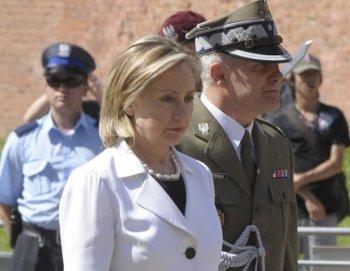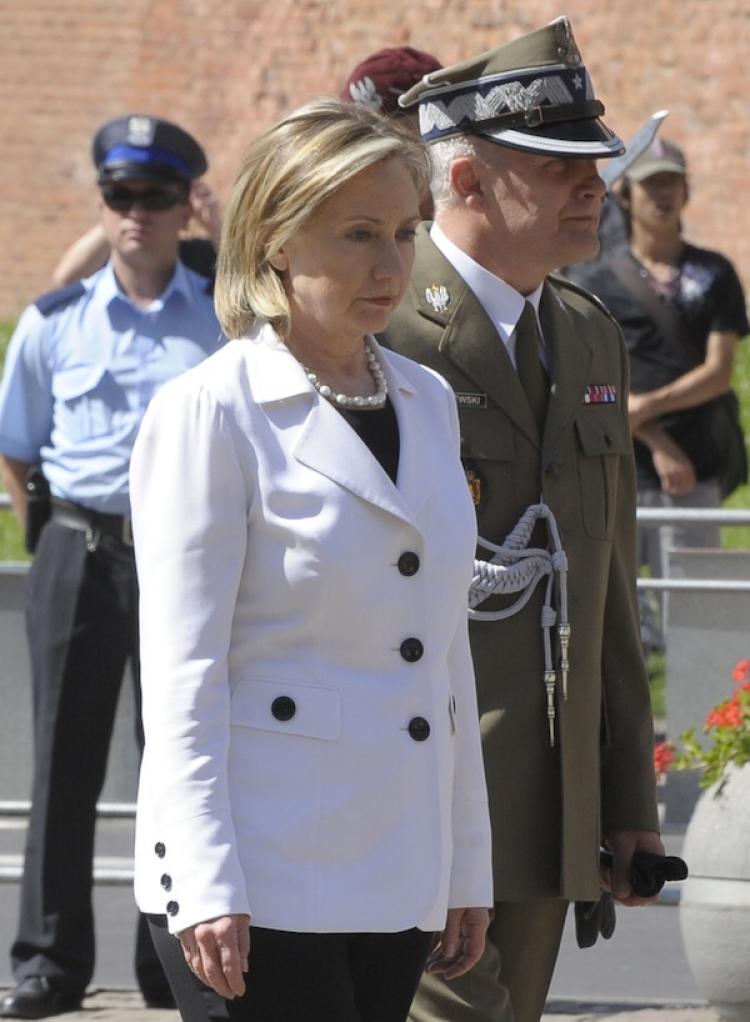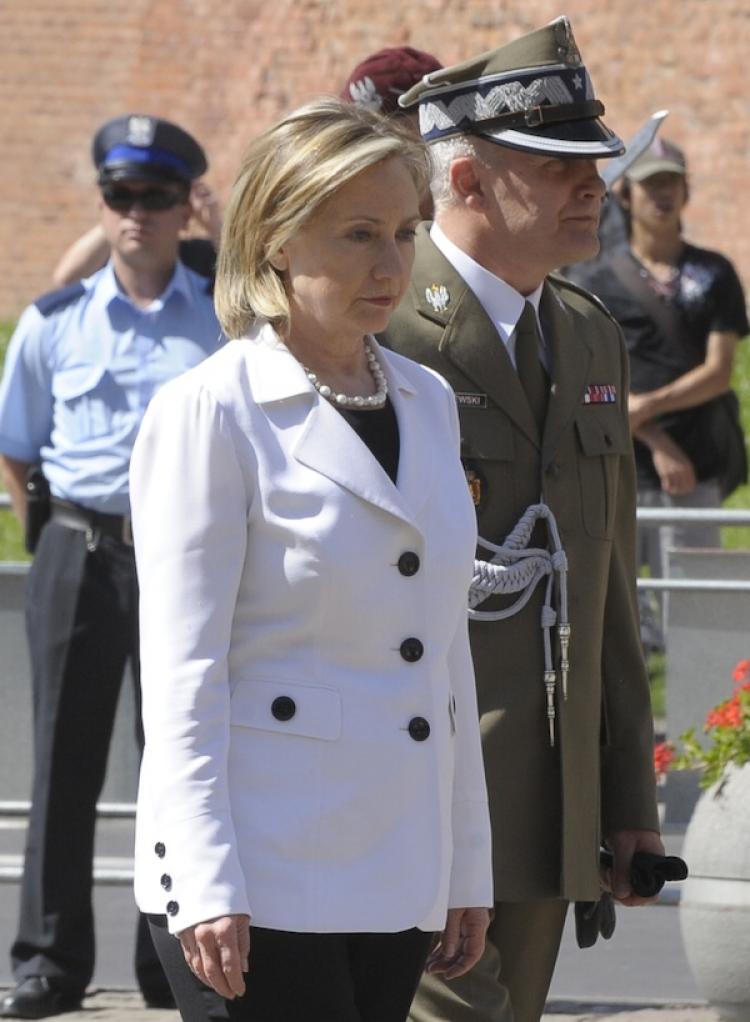KYIV, Ukraine—U.S. Secretary of State Hillary Clinton called on Armenian and Azeri top officials on Sunday to reach a peace deal in a long-running territorial dispute over Nagorno-Karabakh, an Armenian enclave within Azerbaijan’s territory.
After visits to Ukraine and Poland as part of her five-nation tour in Eastern Europe, Clinton arrived in Azerbaijan’s capital of Baku for a meeting with President Ilham Aliyev, on Sunday.
At a news conference with the Republic of Azerbaijan’s minister of Foreign Affairs, Elmar Mammadyarov, Clinton said the United States wants to help the countries find peace, “We stand ready to help both Azerbaijan and Armenia to achieve and implement a lasting peace settlement,” she said.
After her visit to Azerbaijan, Clinton went to Yerevan, Armenia, for dinner with President Sergh Sarkisyan.
Conflict History
Armenia and Azerbaijan have been embroiled in conflict over the mountainous region of Nagorno-Karabakh since 1992. The 5,800-square-mile region is located in Azerbaijan, but is mainly inhabited by ethnic Armenians.
A war between Armenia and Azerbaijan broke out after the Nagorno-Karabakh region wanted to join Armenia after the fall of the Soviet bloc.
A cease fire agreement between the two countries was signed in 1994 following two years of war in which an estimated 30,000 people were killed.
The dispute remains unresolved and relations remain tense with Azerbaijan demanding the instant departure of Armenian military forces from the enclave.
Last month, four ethnic Armenian troops and an Azeri soldier were killed in a gun-battle near Nagorno-Karabakh.
“The United States cannot resolve the conflicts in this region, but we can be a partner, and a supporter, and an advocate,” Clinton said.
The United States, Russia, and the European Union are each interested in stabilizing relations between Azerbaijan, Armenia and Turkey because the region is an important route for oil and gas transportation between the Caspian Sea and the EU.
Turkey’s hostile relations with Armenia intensified over the conflict. Turkey closed its borders and broke diplomatic ties with Armenia in 1993 in support of Azerbaijan. Since then, relations between Turkey and Armenia remain strained.
NATO in Eastern Europe
Clinton’s trip began with visiting first Kyiv, Ukraine, on Friday, where she stated that Ukraine could still join NATO as the military alliance’s door remained open. Clinton’s visit came one day after Kyiv passed a law in Parliament, officially declaring itself a nonaligned nation.
Since Russian-leaning Victor Yanukovych took the presidency of Ukraine in February, he has steered Ukraine off the course of joining NATO set by his pro-Western predecessor Viktor Yushchenko.
Clinton also expressed America’s concern over the state of Ukraine’s democracy given recent complaints of harassment and censorship from journalists and civic activists.
Then the secretary of state went to Poland on Saturday to sign an amendment with Poland to the stalled 2008 missile shield agreement developed under the Bush’s administration. President Obama had held off on the deal after Moscow protested that it amounted to a threat on Russia’s doorstep.
Under President Obama’s revamped missile defense system, Poland will receive SM-3 interceptor missiles by 2018.
Meanwhile, the first battery of U.S. surface-to-air Patriot missiles were deployed in Poland in May—it joined NATO in 1999, a decade after the collapse of the Iron Curtain.
The move has irritated Russia, but U.S. and Polish officials said the actions were part of NATO’s plan to defend its European allies from possible threats from Iran.
In her visit to the post-Soviet countries, Clinton has sought to strengthen ties and give them reassurance of U.S. support. Many of the former Soviet bloc nations have expressed concern over losing U.S. support in the face of the recent reset and improvement in Russian-American relations.
After visits to Ukraine and Poland as part of her five-nation tour in Eastern Europe, Clinton arrived in Azerbaijan’s capital of Baku for a meeting with President Ilham Aliyev, on Sunday.
At a news conference with the Republic of Azerbaijan’s minister of Foreign Affairs, Elmar Mammadyarov, Clinton said the United States wants to help the countries find peace, “We stand ready to help both Azerbaijan and Armenia to achieve and implement a lasting peace settlement,” she said.
After her visit to Azerbaijan, Clinton went to Yerevan, Armenia, for dinner with President Sergh Sarkisyan.
Conflict History
Armenia and Azerbaijan have been embroiled in conflict over the mountainous region of Nagorno-Karabakh since 1992. The 5,800-square-mile region is located in Azerbaijan, but is mainly inhabited by ethnic Armenians.
A war between Armenia and Azerbaijan broke out after the Nagorno-Karabakh region wanted to join Armenia after the fall of the Soviet bloc.
A cease fire agreement between the two countries was signed in 1994 following two years of war in which an estimated 30,000 people were killed.
The dispute remains unresolved and relations remain tense with Azerbaijan demanding the instant departure of Armenian military forces from the enclave.
Last month, four ethnic Armenian troops and an Azeri soldier were killed in a gun-battle near Nagorno-Karabakh.
“The United States cannot resolve the conflicts in this region, but we can be a partner, and a supporter, and an advocate,” Clinton said.
The United States, Russia, and the European Union are each interested in stabilizing relations between Azerbaijan, Armenia and Turkey because the region is an important route for oil and gas transportation between the Caspian Sea and the EU.
Turkey’s hostile relations with Armenia intensified over the conflict. Turkey closed its borders and broke diplomatic ties with Armenia in 1993 in support of Azerbaijan. Since then, relations between Turkey and Armenia remain strained.
NATO in Eastern Europe
Clinton’s trip began with visiting first Kyiv, Ukraine, on Friday, where she stated that Ukraine could still join NATO as the military alliance’s door remained open. Clinton’s visit came one day after Kyiv passed a law in Parliament, officially declaring itself a nonaligned nation.
Since Russian-leaning Victor Yanukovych took the presidency of Ukraine in February, he has steered Ukraine off the course of joining NATO set by his pro-Western predecessor Viktor Yushchenko.
Clinton also expressed America’s concern over the state of Ukraine’s democracy given recent complaints of harassment and censorship from journalists and civic activists.
Then the secretary of state went to Poland on Saturday to sign an amendment with Poland to the stalled 2008 missile shield agreement developed under the Bush’s administration. President Obama had held off on the deal after Moscow protested that it amounted to a threat on Russia’s doorstep.
Under President Obama’s revamped missile defense system, Poland will receive SM-3 interceptor missiles by 2018.
Meanwhile, the first battery of U.S. surface-to-air Patriot missiles were deployed in Poland in May—it joined NATO in 1999, a decade after the collapse of the Iron Curtain.
The move has irritated Russia, but U.S. and Polish officials said the actions were part of NATO’s plan to defend its European allies from possible threats from Iran.
In her visit to the post-Soviet countries, Clinton has sought to strengthen ties and give them reassurance of U.S. support. Many of the former Soviet bloc nations have expressed concern over losing U.S. support in the face of the recent reset and improvement in Russian-American relations.






